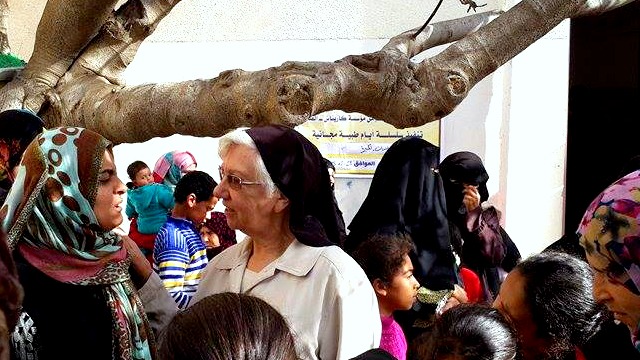
“A bomb waiting to go off”:
It’s the image used by Sister Bridget Tighe, appointed Secretary General of Caritas Jerusalem past January, to describe to SIR the situation in Gaza where she lived and carried out her service for five years. After the heated protests of the past weeks, culminated in the violent clashes of May 14 on the Israeli border, that left dozens dead and thousands wounded, in Gaza these are days of mourning.
“The local population – Sister Tighe told SIR – are in a state of shock for what has happened. These are days of sorrow, of condolences, of visits to the victims’ families. Indeed, Palestinians threw stones, but the response of one of the most powerful, trained, and well-equipped armies in the world was utterly disproportionate.”
As regards Israel’s violation of international law, a few days ago the UN Human Rights Council (HRC), authorized – with a majority vote- the creation of a Commission of Inquiry. The Resolution was firmly rejected by Israel, as well as by Australia and US, members of the UN Security Council. “Now the situation appears to be calmer, and according to reports by Caritas Jerusalem workers in the Strip, “there are no protests or tensions on the border now.” But it can’t be described as a quiet situation after the storm. On the contrary…
Living in Gaza today. “There are many youths among the thousands of people wounded in the clashes – said Sister Tighe –, many were left without limbs, doomed to lifelong disabilities. Gaza’s healthcare system has deteriorated as a result of the blockade imposed by Israel 11 years ago. There is shortage of medical supplies, bandages, pain-killers. The situation in public hospitals is dramatic, many patients are discharged from hospital ahead of time. Caritas provides active support with mobile healthcare units that provide first-aid treatment, but we cannot guarantee hospital care. We are not equipped to treat serious injuries. We have asked further health aid to Caritas Internationalis.” Caritas Jerusalem is present in Gaza since 2004 with various mobile teams operating across the Strip, treating sick children, pregnant women or old people, providing social and psychological support and activities to children traumatized by the war. The healthcare system was sadly the most involved as a result of the protests, but Gaza has many more problems. Sister Tighe made a long list: “After the last three wars, that broke out at a short distance from each other (2009, 2012 and 2014), the reconstruction of houses and infrastructures proceeds at a very slow pace. Some families have returned to partly rebuilt homes, others are still waiting. Electricity is supplied for only 3-4 hours a day, which is not enough to operate air-conditioning or fridges. Most water available is not for drinking. As we enter the summer season living conditions are bound to deteriorate further in terms of hygiene and healthcare. I am thinking of children in particular, old people, people with disabilities, sick people. There are heaps of garbage on the streets, with evident repercussions on public health. Sewage system facilities are limited, and the wastewater is discharged in the sea. There are no jobs and skyrocketing unemployment.”
- Striscia di Gaza (Foto Sir)
“What will be of Gaza?” Gaza’s population numbers 2 million people living in less than 360 square kilometers. The population density is one of the highest in the world. And the number of its inhabitants is constantly growing. The obvious question is: “If the situation does not change, what will be of Gaza?” “What should be done now – replied Sister Bridget – is
to put an end to the Israeli blockade, open the crossings so that people may be free to go out for medical treatment or to work.
This is what a large majority of Gaza’s population is asking. It can be done since Israel has the means to control and monitor the inflow of people. Caritas – its director underlined – is against all forms of violence. Violence is never the solution. Also the blockade is a form of violence. That’s why we believe that opening the crossings, lifting the blockade, could contribute to improve living conditions in Gaza and ease the tension.”
But it does not depend on Israel alone. “The people of Gaza – said the director of Caritas Jerusalem – are caught between two conflicts: Hamas against Israel on the one side and Hamas against Fatah on the other. They stopped hoping in the future, they no longer believe in intra-Palestinian reconciliation.
The young generation grew up fomented by anger. They experienced only clashes and wars.
They were forced to live in inhuman conditions, unable to go beyond the wall that encloses them, unable to socialize with the rest of the world. Thus in desperation they protest on the border, almost going towards suicide.” The doubts of the nun equally involve the intentions of the historical allies of the Jewish State, of the US, of the international community. “What do intend to do for Gaza? What else has to happen to decide to improve the living conditions of its inhabitants?”
“The real challenge is to give this people a future
because – she pointed out – the outbreak of another war is their greatest fear.” A fear that is strongly felt especially by 1000 faithful who belong to the Christian minority living in the Strip.
 A vulnerable, albeit resilient community. “The Christian community in Gaza – concluded Sister Tighe – is suffering with the rest of Gaza’s population. They are not persecuted. Many Christians work in public structures. But like all minorities they are extremely vulnerable. However, they are very resilient, as can be seen in the many projects carried out for the community”. But they are at risk of extinction:
A vulnerable, albeit resilient community. “The Christian community in Gaza – concluded Sister Tighe – is suffering with the rest of Gaza’s population. They are not persecuted. Many Christians work in public structures. But like all minorities they are extremely vulnerable. However, they are very resilient, as can be seen in the many projects carried out for the community”. But they are at risk of extinction:
“In fact the Latin Patriarch, Fr Mario Da Silva, is worried about the exodus of the faithful. Whenever they have the opportunity to leave the Strip, during Christmas and Easter, only few of them return. They prefer to remain in the West Bank, albeit illegally.
Christian young girls try to befriend their peers in Bethlehem or Ramallah through social networks, in order to start a relationship and perhaps get married, which is very difficult in Gaza given the low numbers of Christian youths.”















